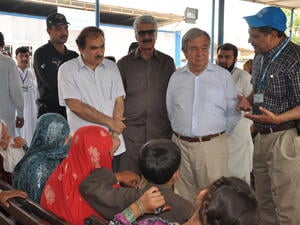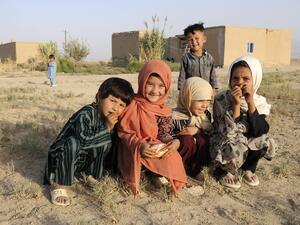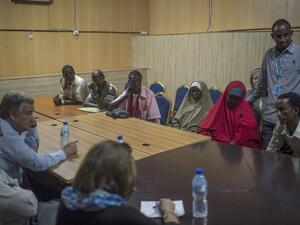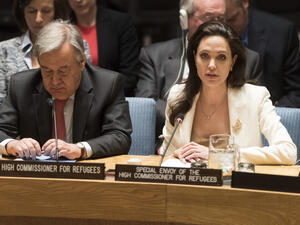High Commissioner's Middle East mission
High Commissioner's Middle East mission
UN High Commissioner for Refugees António Guterres leaves today on a weeklong mission to Saudi Arabia, Kuwait, Jordan and Syria aimed at strengthening cooperation between UNHCR and partners in the four countries and assessing our programmes for hundreds of thousands of displaced Iraqis in the region.
As you know, we just issued a $60 million appeal to fund our work for Iraqis displaced inside their country, for non-Iraqi refugees in Iraq, and for Iraqis and others who have fled to Jordan, Syria, Lebanon, Egypt, Turkey and Iran.
Mr. Guterres begins his mission in Saudi Arabia, where he will have 2-½ days of meetings with senior government officials beginning on Saturday. On Monday, he travels to Kuwait for a two-day visit. In both countries, Mr. Guterres will discuss with senior leaders UNHCR's humanitarian efforts for refugees and internally displaced people in the region and beyond, and explore ways of enhancing cooperation. He is particularly interested in discussing the expanded involvement of Gulf Cooperation Council states in the overall governance and activities of UNHCR. Mr. Guterres will also deliver a lecture at Naif Arab University. It will be his first visit to the Gulf region since he assumed office in June 2005.
About 5 million refugees cared for by UNHCR originate from Organisation of the Islamic Conference (OIC) member or observer states, and most of them are cared for in OIC countries.
On Tuesday evening, Mr. Guterres travels to Amman, Jordan. On Wednesday, he is scheduled to hold a series of meetings with senior government officials, other UN agencies and members of the diplomatic community. He is also scheduled to meet Iraqis who have fled their homeland. On Wednesday evening, he travels to Syria, where he will hold meetings with several senior officials, members of the UN Country Team, diplomats and NGO partners on Thursday and Friday. He will also visit Iraqis who have fled their country and view humanitarian projects and plans by UNHCR and its partners.
Between them, Jordan and the Syrian Arab Republic are hosting more than 1.2 million Iraqis. The High Commissioner wants to get a first-hand look at UNHCR's ongoing efforts to support both governments in addressing the plight of Iraqis; to express his gratitude for their continuing generosity; and to generate more international burden-sharing to help ensure that Iraqis in need of protection and assistance receive it. He will also discuss UNHCR's plans for an international conference on Iraqi displacement in mid-April in Geneva.
The High Commissioner is extremely concerned about the continuing violence and displacement in Iraq and the impact it's having on the region. UNHCR and its partners estimate that out of a total population of 26 million, some 1.8 million Iraqis are currently displaced internally, while up to 2 million others have fled to nearby countries and further afield. While many had fled before 2003, increasing numbers of Iraqis are now fleeing to other areas inside their country. An estimated 640,000 Iraqis became internally displaced over the past year, particularly since the Samarra bombings in February 2006, and up to 50,000 people continue to flee each month.
Estimates of Iraqis displaced in neighbouring states include between 500,000 to 1 million in Syria; up to 700,000 in Jordan (including about 250,000 from before 2003, many of whom enjoy permanent residency); between 20,000 and 80,000 in Egypt; and up to 40,000 in Lebanon. Turkey has a few thousand Iraqis. Some of those in nearby countries also fled before 2003, but tens of thousands are leaving Iraq every month, mostly to Syria and Jordan. The current exodus is the largest population movement in the Middle East since Palestinians were displaced following the creation of the State of Israel in 1948.
Under its $60 million appeal for 2007, UNHCR will provide targeted assistance for up to 250,000 of the most vulnerable internally displaced Iraqis and up to 200,000 of the most vulnerable Iraqis in nearby countries - particularly in Jordan and Syria. So far, the new appeal launched on January 8 has raised $8 million, including $6 million from the Central Emergency Revolving Fund and $2.1 million from Sweden. The latest displacement in and around Iraq evolved over the past year to 18 months amid an escalation of sectarian violence. Prior to that, more than 300,000 Iraqis had actually gone home from other countries in the region since 2003. We saw a dramatic reversal - from 200,000 refugees going home in 2004 alone, to less than 500 returnees in 2006. Unremitting violence in Iraq will likely mean continued mass internal and external displacement affecting much of the surrounding region.






